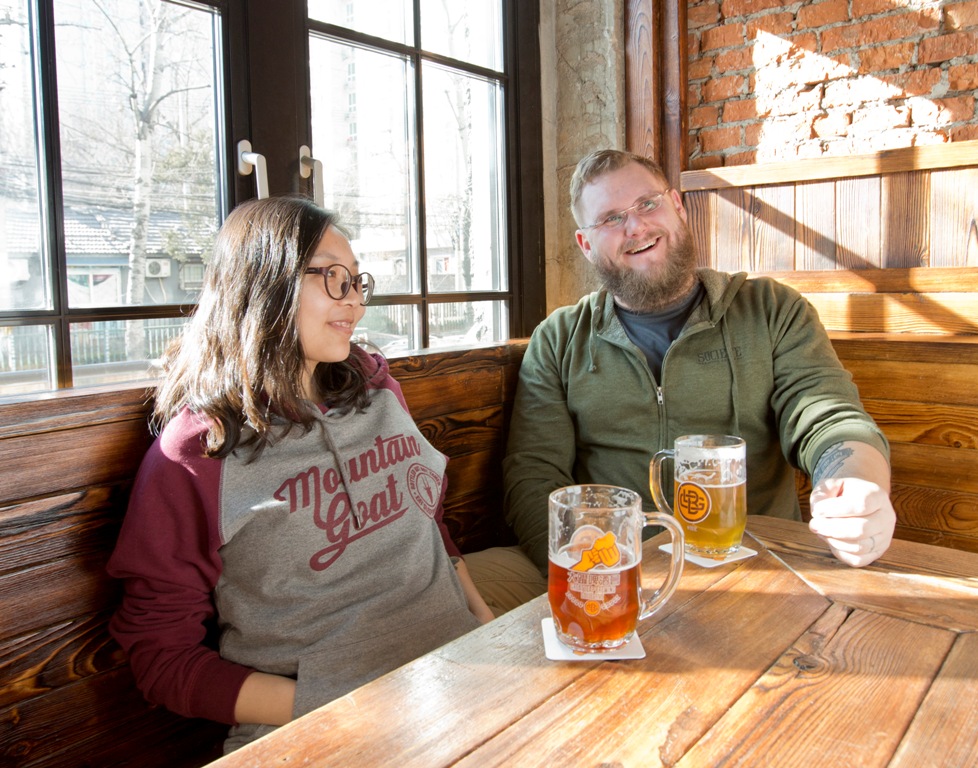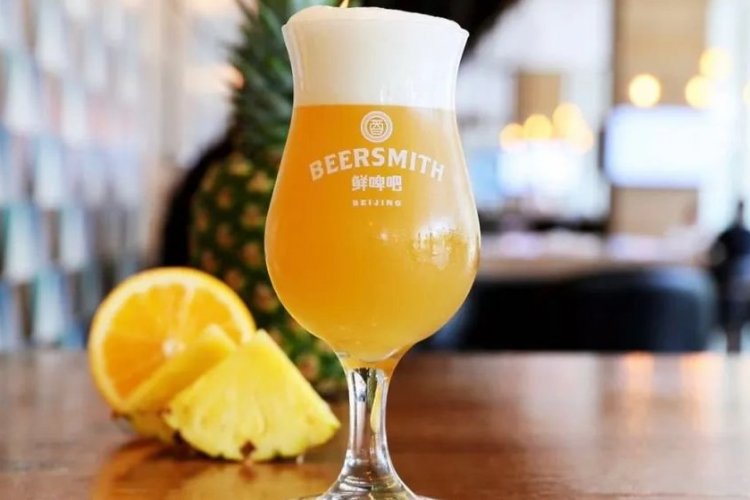Brewing by Numbers: The Owner of Beijing's Champion Bar Talks About the Past and the Future of Craft Beer
It’s a busy Thursday night at Great Leap Brewing #12 Brewpub. The place is heaving, as it seems to be every Thursday night, nay, every night, since the venue opened in June 2013. Owners Carl Setzer and Liu Fang are standing in a nook between the bar and their favorite table – when it’s not occupied by customers – next to two of the venue’s two brewing tanks.
Setzer greets me and then leads me back into the brewing area, and stops to taste one of Great Leap’s 18 beers. He nods approvingly, and then we head back into a storeroom filled with bags of malt, where he offers me a seat and a soft drink (because I was driving). Bagged malt is particularly comfortable to lean against, if not sit on, but the tiled space is probably the quietest area at #12 at that moment.
Since it grabbed seven trophies in 2013, including Bar of the Year, which it has won twice more consecutively, Great Leap Brewing quickly became the Beijinger’s most decorated bar in the history of the Beijinger Reader Bar and Club Awards. In 2015, Great Leap opened the #45 Brewpub and its pizza menu, which promptly placed third in the Beijinger Pizza Cup, behind two-time champion Gung Ho and stalwart Annie’s Pizza. As we leaned on bagged malt, which is surprisingly comfortable, we talked about craft beer in Beijing and the next big jump for GLB.
“In 2015 we opened our third location. But really the beer started getting international acclaim. We started winning awards that you can’t fake. The beer is the same at all three locations. It was having the chance to do collaboration beers with people I’ve always respected,” Setzer says, looking back on the last 12 months.
But the year wasn’t all sunshine and unicorns. “We started seeing a pretty big chasm between craft breweries being opened by Chinese passport holders, and those opened and operated by foreigners,” he says. He defined “chasm” by saying “to see a linear inspiration to Chinese brands but then to be singled out and not get any credit for that is disappointing.” However, a bridge over that gap began to be built in 2015 with the formation of the Craft Brewers Association of China, which includes both Chinese and foreign brewers, including Great Leap Brewing.
Despite the growth of China’s craft beer market over the last seven years, it is still at a nascent stage. “When we get past the social media buzz, just look at the numbers,” Setzer said, comparing the current situation to demand for microbrewing in the United States in the mid-1990s.
“It’s the immaturity of the market – some of the producers don’t know how to assure quality, and the consumers don’t demand freshness. ‘Gray market’ bottles of imported craft beer are being sold that are nine to 12 months past their expiration date,” Setzer says. “People should know what to expect, especially given the prices they are being expected to pay.”
Setzer has now focused on the average Zhou, the beer-drinking man or woman on the street who may be ready for something other than Yanjing. “The people that want a better beer are our market. Not just Great Leap’s market, but all the craft beer manufacturers,” he says. “When our products [and other mass-market products] are lined up next to each other, that’s the moment. The buyer has to do that calculation in his or her head. I need to know that the gemen’r has the choice of how he wants to get drunk,” Setzer says. “I want to put as much Great Leap beer in the hands of as many people as I can.”
He pointed to an unlikely source of inspiration for Great Leap as it developed. “[Former Beijinger editor] Leon Lee started that trend, for bringing real cocktail culture to Beijing. From what he did [at Apothecary, now closed], he showed that Beijing can maintain its grit, but also reach a higher standard,” Setzer says. “It changed the perception of what a Beijing brand could be.”
2016 will at least partly be a year where Great Leap takes stock in what it has done and seeks to improve it. “We run an immensely popular set of bars. No. 12 continues to impress me the crap out of me and I own the place. Original #6’s renovation has taken a year, so we will see what it’s like to have nicer, more comfortable seating there. And when we said New York-style pizza, people doubted it, but now that we have shown we can maintain its quality, expect it. We’ll see what #45 can really do, along with #6.”
Unlike many business owners and entrepreneurs who believe that the process infallibly shapes the company, Setzer might have done it differently. “I would not have put my wife in a position where we could have potentially lost everything. But because my wife is the woman that she is, we didn’t lose everything. If anything, we learned from that failure.”
He is hopeful for the future despite obvious challenges. “I want people in Beijing to be able to take guests to a place that’s better than the place they took you in their city,” Setzer says. “We’re all going to grow up together. But it took a while for people to accept that we could have more than one craft brewery in town.”
More stories by this author here.
Email: stevenschwankert@thebeijinger.com
Twitter: @greatwriteshark
Weibo: @SinoScuba潜水
Photo: Uni
Related stories :
Comments
New comments are displayed first.Comments
![]() Submitted by Guest on Tue, 08/09/2016 - 17:36 Permalink
Submitted by Guest on Tue, 08/09/2016 - 17:36 Permalink
Re: Brewing by Numbers: The Owner of Beijing's Champion Bar...
Can anyone tell me if Great Leap has won any important awards?
Could you clarify what you mean by 'important' awards?
![]() Submitted by Guest on Wed, 08/03/2016 - 15:52 Permalink
Submitted by Guest on Wed, 08/03/2016 - 15:52 Permalink
Re: Brewing by Numbers: The Owner of Beijing's Champion Bar...
Can anyone tell me if Great Leap has won any important awards?
![]() Submitted by Guest on Wed, 08/03/2016 - 15:09 Permalink
Submitted by Guest on Wed, 08/03/2016 - 15:09 Permalink
Re: Brewing by Numbers: The Owner of Beijing's Champion Bar...
Not sure if this is the right place to ask, but does anyone know whether bagged malt is comfortable to lean against?
Many thanks.
![]() Submitted by Guest on Wed, 08/03/2016 - 09:50 Permalink
Submitted by Guest on Wed, 08/03/2016 - 09:50 Permalink
Re: Brewing by Numbers: The Owner of Beijing's Champion Bar...
 This red thing here is what we call a hyperlink. By clicking it you are magically whisked away to another part of this wonderful thing we call the Internet. Do not be afraid, Doggy. The answers you seek lie on the other side.
This red thing here is what we call a hyperlink. By clicking it you are magically whisked away to another part of this wonderful thing we call the Internet. Do not be afraid, Doggy. The answers you seek lie on the other side.
Validate your mobile phone number to post comments.







